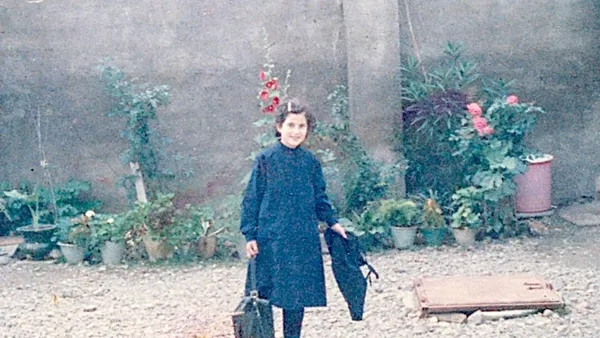Eye For Film >> Movies >> My Stolen Planet (2024) Film Review
My Stolen Planet
Reviewed by: Sergiu Inizian

Personal and political histories are often intertwined, flowing together in time as relationships with family, friends and governments form and fall apart. In Farahnaz Sharifi's first feature documentary, Iranian political oppression brutally clashes with personal needs. Searching for a refuge from a strict regime that imposed on her will most of her life, she creates a riveting alternative timeline. The collage of 8mm film, digital footage and cellphone clips encompasses not only her struggle but also reflects the lasting challenges of her homeland, trapped in a cycle of violence.
Growing up after the Islamic revolution of 1979, Sharifi's history is moulded by a regime that stands between her and her freedom. The disconnect between archival images of dancing and modern footage of burning hijabs sends a stark message about the rich personal lives of Iranians. They want to be free to enjoy life to the fullest. Her diary follows the rhythm of gratifying parties and enters people's homes, sharing an archive of film stock that contains a joy hidden from the authorities' view. In her vision, dancing heals wounds and defies those who wish to suppress hope.

Sharifi's collection of 8mm film from unknowable households tells a story of deep affection for documenting life. Whether it's analogue or digital, shooting film is a vibrant endeavour. It seeks vitality. And in doing so, it becomes a tool for resilience. As we see intense images of protests and cruelty, the director's emotional voice muses over the idea of forgetting. Her mother's declining memory pushes her to fight against disregard both on a personal level and in public space. Through a collage of footage shot by numerous brave protesters, she pieces together a statement about film as identity, in a country where the individual slowly fades away.
The director is unshakeable in her conviction to expose an atrocious regime, refusing to edit extreme violence out of her fearless diary. Unable to find meaningful respite in the simple pleasures of private life, she stares cruelty in the eye, shocking the audience to its core. Necessary images document oppression and shine a light on the unyielding courage of ordinary people. Silence settles in, allowing the imagery to tell difficult truths about how Sharifi and those who champion freedom navigate an imbalanced struggle with an abusive state. In the background, the arduous sound of a methodical machine grows louder, scanning frame after frame and signalling a gradual loss of spirit.
Sharifi leaves for Germany, a feeling of futility overcoming the screen. The remaining joy is captured within the jubilant imagery of the past. An alternative history of Iran, that stands between her and the complete abandonment of her homeland. As Atena Eshtiaghi's impressive score turns eerie, the detachment between personal aspiration and external tyranny becomes more noticeable. Parties become protests, marching replaces dancing and Sharifi's longing for a graceful childhood transforms into piercing activism. Through shattered glass and withered celluloid, she challenges a regime that took so much from her and her loved ones, finding what little solace is left in a charming, albeit fading intimate life.
Reviewed on: 21 Feb 2024
















